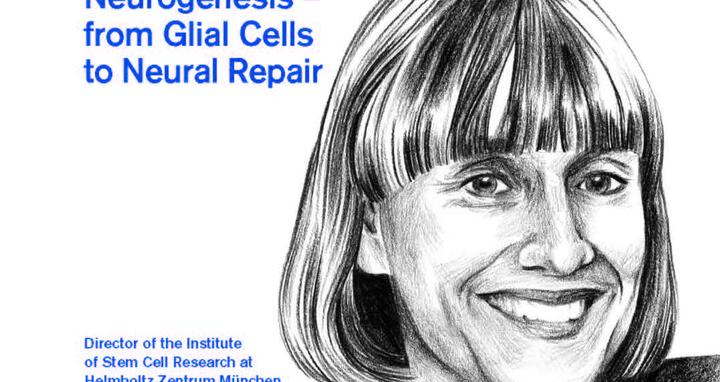More than just glue
Magdalena Götz will give a public lecture entitled „Mechanisms of Neurogenesis – from Glial Cells to Neural Repair“ at 2 pm on Wednesday, September 24, in the MDCC. (If you want to join us for the event, please send an email.) Prof. Götz’s work focuses on glial cells (named for the Greek word for „glue“), known for their role in gluing together neurons. She was first to discover that they play a much greater role in the brain. Glial cells can also act as stem cells that develop into neuronal cells. These findings led to a paradigm shift in neuroscience. Now working in Munich, the highly decorated scientist is trying to deliberately reprogram glial cells to generate functional neuronal cells. Prof. Götz’s studies are considered crucial for experiments that aim to gain control of the specific differentiation of stem cells, one of the main challenges in applied stem cell research.
The public lecture accompanies the award of the 2014 Ernst Schering Prize to Prof. Götz. She is Director of the Institute for Stem Cell Research at the German Research Center for Environmental Health (HelmholtzZentrum München) and Head of the Department of Physiological Genomics at the Ludwig Maximilian University Munich. Among the many prizes she has already been awarded is the Leibniz Prize of the German Research Foundation (DFG). To learn more about the work of Prof. Götz visit her group’s pages.
The Ernst Schering Prize is one of the most prestigious awards in Germany and comes with a prize of 50,000 Euros. Since 1992 it has been awarded annually for excellent work in the field of biological, medical or chemical basic research. The list of winners resembles a who’s who of basic research in the fields mentioned above. Six years ago, MDC’s Klaus Rajewsky won the prize while working at the Immune Disease Institute at the Harvard Medical School, Boston, USA. Other Schering Prize winners are Christiane Nüsslein-Vollhard (later to become a Nobel laureate), seven Leibniz Prize winners and five scientists who also received the Max Delbrück Medal. See the entire list here.
Ernst Christian Friedrich Schering, for whom the prize is named, started his career as a „pharmacist 1st class“ in Berlin in 1850. The high purity of his products quickly established Schering’s reputation in pharmaceutical production in Berlin. His success enabled him to open a second site, the Chemische Fabrik Ernst Schering, which later became the Schering AG. Ernst Schering died in 1889 at the age of 65 in Berlin.
Public lecture „Mechanisms of Neurogenesis – from Glial Cells to Neural Repair“
Wednesday, September 24, 2.15 pm
MDC.C | Max Delbrück Communications Center (Axon II)
Robert-Rössle-Straße 10 | 13125 Berlin






